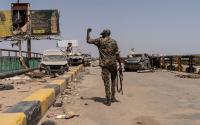22 May 2008Peter Mandelson
The food crisis has reinforced two things about the future of agricultural trade.
The first is that a growing world population, higher incomes and changes in diet are pushing up global demand for food faster than farmers can supply it. The second is that throwing up new barriers to farm trade on this crowded planet is not the way to fix this.
Faced with such a crisis there should be only one imperative: to make sure nobody goes hungry. Our first response should be to get emergency food where it is needed. In this, Europe is playing its part, dispatching tens of millions in food aid and readying to give more.
But addressing the deeper questions of supply and demand matters as much. Here it is important to draw the right conclusions because some people are racing to draw the wrong ones.
Already some politicians in Europe and elsewhere are invoking "food security" as an argument for higher farm tariffs and protected agricultural markets. Some are suggesting we should dust off the sort of trade-distorting farm subsidies that Europe abandoned in its successful CAP reforms of 2003. They even suggest that other economies should do the same. Such arguments are worrying and wrong.
In the global age, food security can only make sense at a global level. Europe's CAP reforms recognize this.
Not every country on earth has the capacity to produce enough food for its population. Some have more capacity than they could ever need. Policies that pursue food security by hobbling exports cut off farmers from the international market signals that encourage them to produce for a growing market.
They drive up global food prices by restricting supply. For net food-importing countries like most of Africa they are a disaster, cutting off, or pushing up the price of, imported food. As some have noted, not so much beggar-thy-neighbor policies, as starve-thy-neighbor. One country's temporary food security can be another's food scarcity.
In reality what the global economy needs are two things.
First, greater production capacity through better land use and improved crop science. The developed world should be channeling aid into farm capacity in the poorest parts of the developing world. That means fertilizer, improved technology and better infrastructure for getting goods to market. This means the developed world sticking to its commitments on development finance and aid for trade.
Second, we need dynamic farm markets that encourage farmers to improve productivity and grow so as to feed a growing world market. This means progressive liberalization of agricultural markets, which have been closed for decades while the rest of the global economy has gradually opened up. Not opened overnight, but prudently, in a way that reflects a country's capacity and respects the impact of reform on farmers.
The EU is removing import tariffs for all exports, including agriculture, from African, Pacific and Caribbean countries and all of the world's 50 poorest states and is investing heavily in helping their farmers produce for the European market. Other developed countries should do the same.
Despite the caricature, the most protected farm markets in the world by far are not in the developed world, but among developing countries. Sometimes these tariffs protect subsistence farmers. But often they stand in the way of the creation of regional farm markets that could spur greater agricultural output and productivity.
A Doha World Trade Organization trade deal would be one step toward opening these markets and creating new opportunities for farmers. By setting out to build regional markets, Europe's Economic Partnership Agreements with African, Caribbean and Pacific countries have tried to address the same problems.
A Doha deal would also contribute to fairer farm trade by eliminating all farm export subsidies and locking in the reform of subsidies to farmers in the rich world. Poor farmers would no longer be forced to compete with subsidized goods from the rich world, either in their own or export markets.
It is true that the reform of subsidies in the rich world means that urban consumers in some parts of the developing world would no longer benefit from cheap, dumped goods from the rich world. But it should take only a moment's reflection to know that subsidizing our farmers to overproduce and dump excess produce in developing countries is economically irrational, to put it mildly.
We should address short-term needs through aid and invest in greater farm productivity in these countries which, along with rising global supply, will ultimately lower prices.
The wrong response would be perpetuating a system that has squeezed some of the poorest farmers in the world. We need to carefully manage our biofuels policies to ensure that they do not have a similarly distorting effect on global markets.
Like many crises, the food crisis is a political opportunity. The question is: for what? It can spur the developed and developing worlds into greater investment in agricultural productivity and reform of global farm trade through the Doha Round. Or it can be a pretext for a damaging retreat into agricultural protectionism. Either way, for good or ill, it will be the poorest who reap what we sow.
Peter Mandelson is the European Union Trade Commissioner.
http://www.iht.com/bin/printfriendly.php?id=13130026





